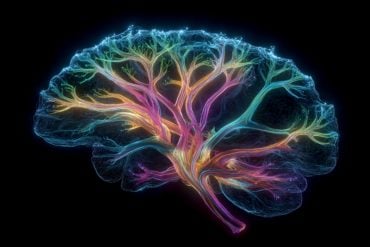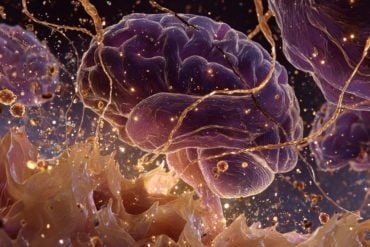Summary: A new study strengthens previous research linking dental health to dementia and cognitive decline. Researchers found tooth loss is a risk factor for cognitive decline and dementia, and with each tooth lost, the risk for cognitive impairment increases.
Source: NYU
Tooth loss is a risk factor for cognitive impairment and dementia–and with each tooth lost, the risk of cognitive decline grows, according to a new analysis led by researchers at NYU Rory Meyers College of Nursing and published in JAMDA: The Journal of Post-Acute and Long-Term Care Medicine. However, this risk was not significant among older adults with dentures, suggesting that timely treatment with dentures may protect against cognitive decline.
About one in six adults aged 65 or older have lost all of their teeth, according to the Centers for Disease Control and Prevention. Prior studies show a connection between tooth loss and diminished cognitive function, with researchers offering a range of possible explanations for this link. For one, missing teeth can lead to difficulty chewing, which may contribute to nutritional deficiencies or promote changes in the brain.
A growing body of research also points to a connection between gum disease–a leading cause of tooth loss–and cognitive decline. In addition, tooth loss may reflect life-long socioeconomic disadvantages that are also risk factors for cognitive decline.
“Given the staggering number of people diagnosed with Alzheimer’s disease and dementia each year, and the opportunity to improve oral health across the lifespan, it’s important to gain a deeper understanding of the connection between poor oral health and cognitive decline,” said Bei Wu, PhD, Dean’s Professor in Global Health at NYU Rory Meyers College of Nursing and co-director of the NYU Aging Incubator, as well as the study’s senior author.
Wu and her colleagues conducted a meta-analysis using longitudinal studies of tooth loss and cognitive impairment. The 14 studies included in their analysis involved a total of 34,074 adults and 4,689 cases of people with diminished cognitive function.
The researchers found that adults with more tooth loss had a 1.48 times higher risk of developing cognitive impairment and 1.28 times higher risk of being diagnosed with dementia, even after controlling for other factors.
However, adults missing teeth were more likely to have cognitive impairment if they did not have dentures (23.8 percent) compared to those with dentures (16.9 percent); a further analysis revealed that the association between tooth loss and cognitive impairment was not significant when participants had dentures.

The researchers also conducted an analysis using a subset of eight studies to determine if there was a “dose-response” association between tooth loss and cognitive impairment–in other words, if a greater number of missing teeth was linked to a higher risk for cognitive decline. Their findings confirmed this relationship: each additional missing tooth was associated with a 1.4 percent increased risk of cognitive impairment and 1.1 percent increased risk of being diagnosed with dementia.
“This ‘dose-response’ relationship between the number of missing teeth and risk of diminished cognitive function substantially strengthens the evidence linking tooth loss to cognitive impairment, and provides some evidence that tooth loss may predict cognitive decline,” said Xiang Qi, a doctoral candidate from NYU Meyers.
“Our findings underscore the importance of maintaining good oral health and its role in helping to preserve cognitive function,” said Wu.
In addition to Wu and Qi, study authors include Zheng Zhu of Fudan University and Brenda L. Plassman of Duke University.
Funding: This research is partially supported by the National Institutes of Health (1R56AG067619 and U01DE027512).
About this dementia research news
Source: NYU
Contact: Rachel Harrison – NYU
Image: The image is in the public domain
Original Research: Closed access.
“Dose-Response Meta-Analysis on Tooth Loss With the Risk of Cognitive Impairment and Dementia” by Bei Wu et al. The Journal of Post-Acute and Long-Term Care Medicine
Abstract
Dose-Response Meta-Analysis on Tooth Loss With the Risk of Cognitive Impairment and Dementia
Objectives
To quantify the dose-response associations between tooth loss and risk of cognitive impairment and dementia.
Design
Longitudinal studies that examined the association between tooth loss and cognitive function were systematically searched on 6 databases through March 1, 2020. The study adhered to Preferred Reporting Items for Systematic Reviews and Meta-Analyses (PRISMA) reporting guidelines. Risk estimates were pooled using random-effects models. The dose-response associations were assessed using generalized least squares spline models.
Setting and Participants
Adults from community, institution, outpatient or in-hospital were included in the meta-analysis.
Measures
Cognitive impairment and dementia were defined by neuropsychological tests, diagnostic criteria, or medical records. Tooth loss was self-reported or assessed by clinical examinations.
Results
Fourteen studies were entered into the meta-analysis, including 34,074 participants and 4689 cases with diminished cognitive function. Participants with more tooth loss had a 1.48 times higher risk of developing cognitive impairment [95% confidence interval (CI) 1.18–1.87] and 1.28 times higher risk of being diagnosed with dementia (95% CI 1.09–1.49); however, the association was nonsignificant for participants using dentures (relative risk = 1.10, 95% CI 0.90–1.11). Eight studies were included in the dose-response analysis, and data supported the use of linear models. Each additional tooth loss was associated with a 0.014 increased relative risk of cognitive impairment and 0.011 elevated relative risks of dementia. Edentulous participants faced a 1.54 times higher risk of cognitive impairment and a 1.40 times higher risk of being diagnosed with dementia.
Conclusions and Implications
Moderate-quality evidence suggested tooth loss was independently associated with cognitive impairment and dementia; risk of diminished cognitive function increased with incremental numbers of teeth lost. Furthermore, timely prosthodontic treatment with dentures may reduce the progression of cognitive decline related to tooth loss.







